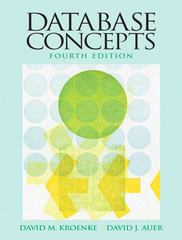Answered step by step
Verified Expert Solution
Question
1 Approved Answer
A positive integer is perfect if it equals the sum of all of its factors, excluding the number itself. Use a list comprehension and the
A positive integer is perfect if it equals the sum of all of its factors, excluding the
number itself. Use a list comprehension and the following function factors:
factors :: Int Int
factors n x x n n mod x
to define a function perfects :: Int Int that returns the list of all perfect numbers up to
a given limit For example in GHCi:
perfects
Hint: define an auxiliary function isperfect :: Int Bool which returns True if the given Int
is perfect, and False otherwise. Then use isperfect as a guard in a list comprehension to filter
out all of the nonperfect integers, ie to keep only the perfect integers.A positive integer is perfect if it equals the sum of all of its factors, excluding the
number itself. Use a list comprehension and the following function factors:
factors :: Int Int
factors n x x n n mod x
to define a function perfects :: Int Int that returns the list of all perfect numbers up to
a given limit For example in GHCi:
perfects
Hint: define an auxiliary function isperfect :: Int Bool which returns True if the given Int
is perfect, and False otherwise. Then use isperfect as a guard in a list comprehension to filter
out all of the nonperfect integers, ie to keep only the perfect integers.
Step by Step Solution
There are 3 Steps involved in it
Step: 1

Get Instant Access to Expert-Tailored Solutions
See step-by-step solutions with expert insights and AI powered tools for academic success
Step: 2

Step: 3

Ace Your Homework with AI
Get the answers you need in no time with our AI-driven, step-by-step assistance
Get Started


